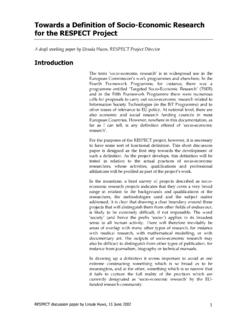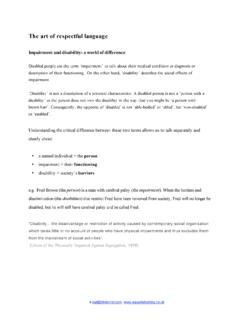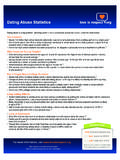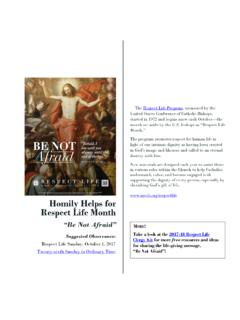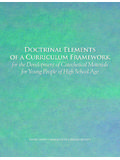Transcription of An EU Code of Ethics for Socio-Economic Research
1 AN EU CODE OF Ethics FORSOCIO- economic RESEARCHO ther titles from the respect Project:Intellectual Property Aspects of Socio-Economic ResearchGn dig N, Grosse Ruse H, Giannakoulis MIES Report 413, 2004. ISBN 1 85184 343 4 Functional Map of a European Socio-Economic Research ProjectSchryvers E, Van Gyes G, Vanderbrande TIES Report 414, 2004. ISBN 1 85184 344 2 Data Protection Aspects Within the Framework of Socio-Economic ResearchRosier K, Vereecken IIES Report 415, 2004. ISBN 1 85184 345 0 Socio-Economic Research in the Information Society:A User s Guide from the respect ProjectHuws UIES Report 416, 2004. ISBN 1 85184 346 9A catalogue of these and over 100 other titles is available from IES, or on the IES Website, online resources, see project funded by the EuropeanCommission s Information SocietyTechnologies (IST) ProgrammeAn EU Code of Ethics forSocio- economic ResearchSally DenchRon IphofenUrsula HuwsPublished as IES Report 412 by:THE INSTITUTE FOR EMPLOYMENT STUDIESM antell BuildingFalmerBrighton BN1 9 RFUKTel.
2 + 44 (0) 1273 686751 Fax + 44 (0) 1273 2004 The Institute for Employment StudiesNo part of this publication may be reproduced or used in any form by any means graphic,electronic or mechanical including photocopying, recording, taping or information storage orretrieval systems without prior permission in writing from the Institute for :The views expressed in this report are those of the authors and do not necessarily reflect theviews of the European Library Cataloguing-in-Publication DataA catalogue record for this publication is available from the British LibraryISBN 1 85184 342 6 Printed in Great BritainiiiThe respect project is about: respect for Research ethicsRESPECT for intellectual propertyRESPECT for confidentialityRESPECT for professional qualificationsRESPECT for professional standardsRESPECT for Research usersThe aims of the project are to:!
3 Develop a voluntary code of practice for the conduct of Socio-Economic Research in the Information Society! contribute to the development of common Europeanstandards and benchmarks for Socio-Economic Research ! contribute to the development of high standards in cross-national and cross-disciplinary Socio-Economic Research .! contribute to broader ethical and professional debates withinthe Socio-Economic Research community! help reduce barriers to the mobility of socio -economicresearchers within the EU and Accession States! provide succinct information on good practice in Socio-Economic Research for Research users both inside and outsidethe IST full details, see the project website: SummaryviiGuidelines for Conducting Ethical Socio-Economic Research xix1.
4 Do Ethics matter? themes in ethical of the rest of this report162. Responsibilities to society and minimising social professional integrity with respect fornational and international for, and awareness of, gender for all groups, regardless of race, ethnicity,religion and for under-represented social groups andthe avoidance of marginalisation or exclusion the concerns of relevant stakeholdersand user groups273. Professional Expertise and an appropriate Research method on thebasis of informed professional the Research team has the necessaryprofessional expertise and unwarranted material gain or loss to factual accuracy and avoiding on the consequences of researchengagement for all that reporting and dissemination arecarried out in a responsible methodology and findings fordiscussion and peer previous Research as a source ofknowledge, data, concepts and methodology53vi4.
5 Responsibilities to Research participation in from an informed data with appropriate confidentiality Research participants from undueintrusion, harm or distress76 References84 Ethical Codes and Guidelines90viiExecutive SummaryThe respect project (Professional and Ethical Codes forTechnology-related Socio-Economic Research ) was funded underthe European Commission IST programme. The aims of thisproject were to:! develop a voluntary code of practice for the conduct of Socio-Economic Research in the Information Society! contribute to the development of common European standardsand benchmarks for Socio-Economic Research !
6 Contribute to the development of high standards in cross-national and inter-disciplinary Socio-Economic Research ! contribute to the broader ethical and professional debateswithin the Socio-Economic Research community! help reduce the barriers to the mobility of socio -economicresearchers with the EU and Accession States! provide succinct information on good practice in Socio-Economic Research for Research users, both inside and outsidethe IST first stage of the respect project involved the development ofguidelines, or codes, in a number of separate areas: data protection,intellectual property rights, Research Ethics , professional issuesand professional competencies.
7 Following consultation on these,an overall of code of practice was developed covering all theseareas. This was accompanied by a user s guide to socio -economicresearch, designed for those who commission Research , evaluateresearch proposals and review the report addresses one aspect of the respect project: thedevelopment of a set of ethical guidelines or a code of standardsto inform the conduct of Socio-Economic Research in the EuropeanUnion. These guidelines are aimed at all those involved in Socio-Economic Research , whether commissioning, bidding for ormanaging projects, or working as part of a Research team on or codes of practice offer a framework in whichresearchers can work.
8 They do not, however, offer all the ethical decisions still involves addressing a series ofdilemmas and, ultimately, decisions have to be reached by theviiiresearchers involved. Ethical guidelines enable these decisions tobe made from an informed position. Ethical guidelines also offerprotection to researchers, providing them with a source to quote ifpressured by others to adopt unethical guidelines aim to offer minimum acceptable standards forthe conduct of ethical Research in Europe. However, guidelines ontheir own are not enough; they only offer a starting point. What isneeded is an ethical conscience so that making ethical decisionsbecomes an automatic part of the Research process.
9 Guidelines canbe used as part of the educational process leading to guidelines have been constructed at four levels. The first threeprovide a summary of the main principles and possible dilemmas,and these are included in this summary. The report is the fourthlevel, providing a more detailed discussion of the issuesunderlying the main principles, the nature of dilemmas that maybe faced in ethical decision making, and how some of these ethicalissues may be addressed in Research aims of any study should both benefit societyand minimise social harmThe general principleIt is the responsibility of both the commissioner of Research andthe researchers who conduct the work, jointly, to develop a set ofresearch aims and objectives which benefit society and minimisesocial harm.
10 This means that any benefits derived from theresearch should outweigh any harm that may need to be addressedHow should it be assessed whether the need for the researchoutweighs any potential harm it might cause? Who should beresponsible for making the assessment researcher, commissioneror some independent agency? How can the interests of the rangeof different stakeholders be balanced? How can the interests ofother stakeholder groups, who may not be directly involved in theresearch project, be protected?Who decides what constitutes harm and benefits? How can thedifferent understanding of what these are for different groups bereconciled?
